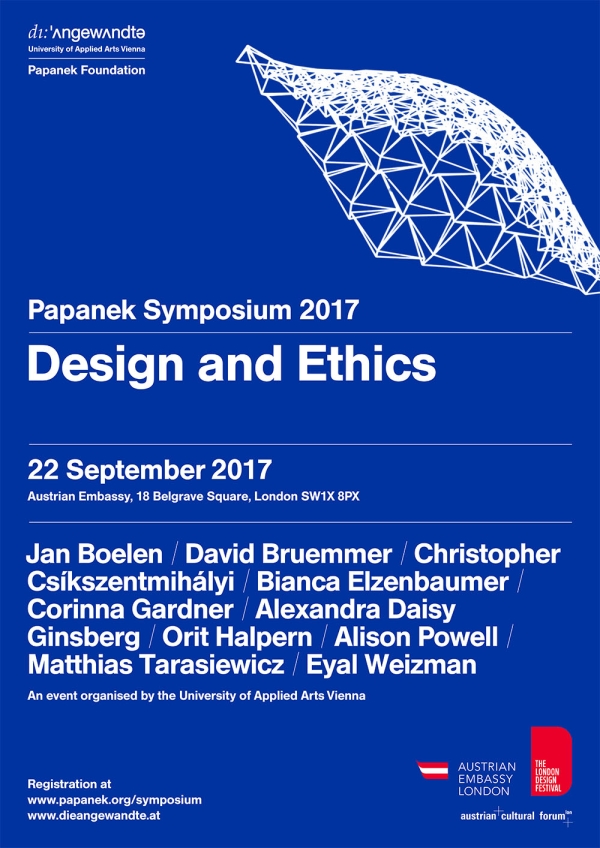Design
and architecture occupy a powerful and precarious responsibility within this complexity, which goes beyond mere application
and facilitation. The Papanek Symposium 2017 considers the deeply embedded social and political implications of design; a
practice which can be so vulnerable to co-option and yet conversely so valuable as a form of dissent. It explores the unique
position of design practice and research- contemporary, historical and anthropological-to address questions of ethics in design.
Bringing academics and designers into dialogue, it aims to generate new ideas and critical thinking on the state of ethics
in design and architecture today.
Speakers include Jan Boelen (Z33, Belgium), David Bruemmer (5D Robotics,
USA), Prof. Chris Csíkszentmihályi, (Madeira Interactive Technologies Institute, Portugal) Dr. Bianca Elzenbaumer (Leeds College
of Art/Brave New Alps, UK), Corinna Gardner (Victoria and Albert Museum, UK), Alexandra Daisy Ginsberg (Royal College
of Art, UK), Dr. Orit Halpern (Concordia University, Canada), Dr. Alison Powell (London School of Economics, UK), Matthias
Tarasiewicz (RIAT, Austria), Prof. Eyal Weizman (Goldsmiths, University of London, UK).
Papanek Lecture
2017: The Architectural Sensorium Following the Papanek Symposium 2017: Design & Ethics, Professor
Eyal Weizman, Architect, Professor of Spatial and Visual Cultures and Director of Forensic Architecture at Goldsmiths,
University of London will deliver the 2017 Papanek Lecture, ‘The Architectural Sensorium’.
In recent
years Forensic Architecture began using novel research methods to undertake a series of investigations into human rights abuses.
Today, the group provides crucial evidence for international courts and works with a wide range of activist groups, NGOs,
Amnesty International, and the UN. Beyond shedding new light on human rights violations and state crimes across the globe,
Forensic Architecture has also created a new form of investigative practice that bears its name. The group uses architecture
as an optical device to investigate armed conflicts and environmental destruction, as well as to cross-reference a variety
of evidence sources, such as new media, remote sensing, material analysis, witness testimony, and crowd sourcing. In this
lecture Eyal Weizman, the group’s founder, provides an in-depth introduction to the history, practice, assumptions, potentials,
and double binds of this practice.
Directed by: Professor Alison J. Clarke
Organised by Dr. Leah Armstrong
and Professor Alison J. Clarke
Hosted by His Excellency Dr. Martin Eichtinger, Austrian Ambassador to the United Kingdom,
Austrian Embassy UK
Organised in collaboration with the Austrian Embassy, London and Austrian Cultural Forum,
London and in official partnership with the London Design Festival.
Public event, free of charge, registration
required.
For more information, including full programme and registration, please visit:
http://papanek.org/symposium/http://papanek.org/lecture/http://www.londondesignfestival.com/events/victor-papanek-symposium-lecture-2017 



